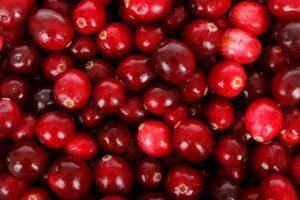
Image by PublicDomainPictures from Pixabay
New research has demonstrated that cranberries can help prevent neurodegenerative diseases such as dementia. The study conducted by the University of East Anglia team showed how eating the equivalent of a cup of cranberries a day can improve memory and give some protection against dementia.
It is well known that oxidative stress and inflammation are major factors contributing to aging and the development of age-related neurodegenerative diseases.
The results, published in the Frontiers in Nutrition, showed that consuming cranberries significantly improved the participants’ – 50 to 80-year-olds – memory of everyday events (visual episodic memory), neural functioning, and delivery of blood to the brain (brain perfusion).
Lead researcher Dr. David Vauzour, from UEA’s Norwich Medical School, said: “Dementia is expected to affect around 152 million people by 2050. There is no known cure, so it is crucial that we seek modifiable lifestyle interventions, such as diet, that could help lessen disease risk and burden.
“Past studies have shown that higher dietary flavonoid intake is associated with slower rates of cognitive decline and dementia. And foods rich in anthocyanins and proanthocyanidins, which give berries their red, blue, or purple colour, have been found to improve cognition.
“Cranberries are rich in these micronutrients and have been recognized for their antioxidant and anti-inflammatory properties.
“We wanted to find out more about how cranberries could help reduce age-related neurodegeneration.”
The research team investigated the impact of eating cranberries for 12 weeks on brain function and cholesterol among 60 cognitively healthy participants.
Half of the participants consumed freeze-dried cranberry powder, equivalent to a cup or 100g of fresh cranberries, daily. The other half consumed a placebo.
The study is one of the first to examine cranberries and their long-term impact on cognition and brain health in humans.
The results showed that consuming cranberries significantly improved the participants’ memory of everyday events (visual episodic memory), neural functioning and delivery of blood to the brain (brain perfusion).
Dr. Vauzour said: “We found that the participants who consumed the cranberry powder showed significantly improved episodic memory performance in combination with improved circulation of essential nutrients such as oxygen and glucose to important parts of the brain that support cognition—specifically memory consolidation and retrieval.
“The cranberry group also exhibited a significant decrease in LDL or ‘bad’ cholesterol levels, known to contribute to atherosclerosis—the thickening or hardening of the arteries caused by a build-up of plaque in the inner lining of an artery. This supports the idea that cranberries can improve vascular health and may in part contribute to the improvement in brain perfusion and cognition.
“Demonstrating in humans that cranberry supplementation can improve cognitive performance and identifying some of the mechanisms responsible is an important step for this research field.
“The findings of this study are very encouraging, especially considering that a relatively short 12-week cranberry intervention was able to produce significant improvements in memory and neural function,” he added.
“This establishes an important foundation for future research in the area of cranberries and neurological health.”
The study was supported by a grant from The Cranberry Institute. It was led by the University of East Anglia in collaboration with researchers at the Leiden University Medical Center (Netherlands), the University of Parma (Italy) and the Quadram Institute (UK).
Sign up for the QuackTrack.org newsletter below!













